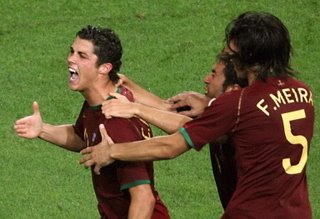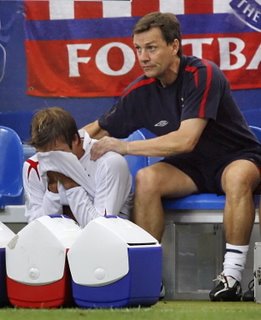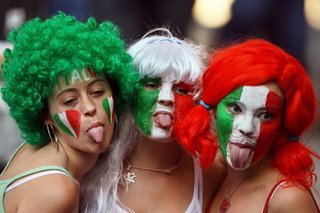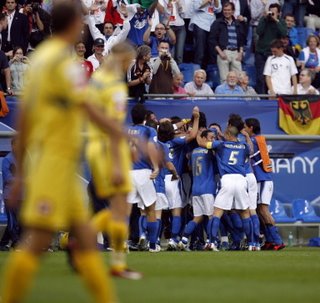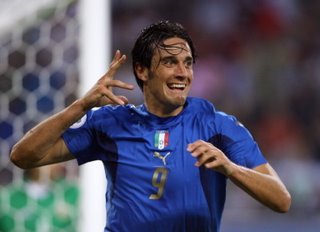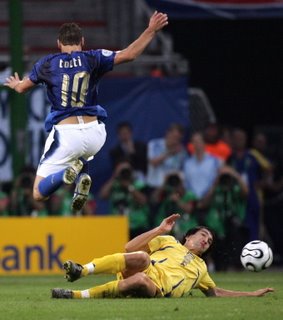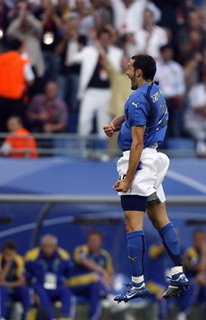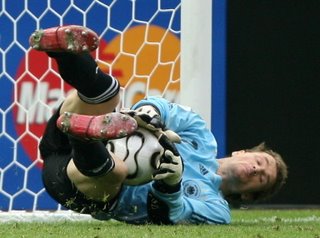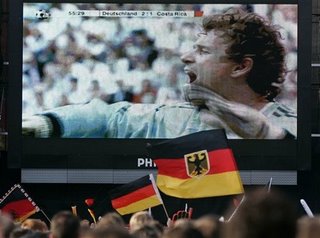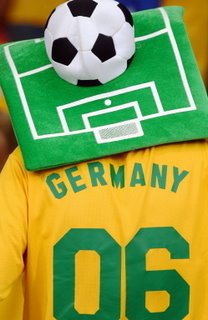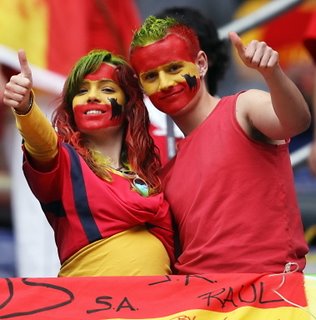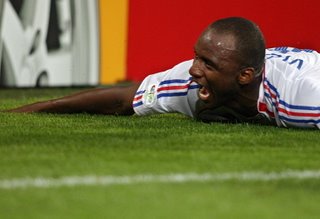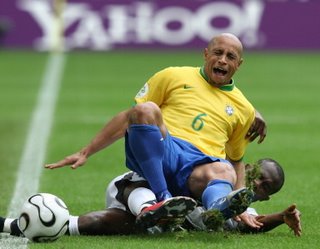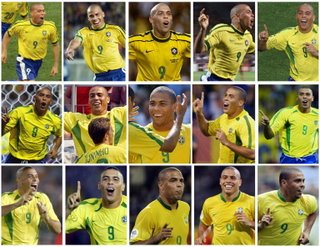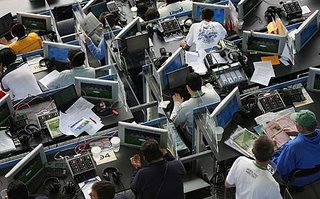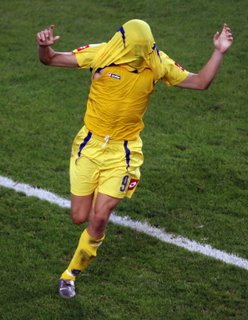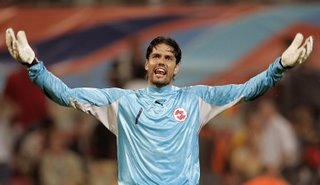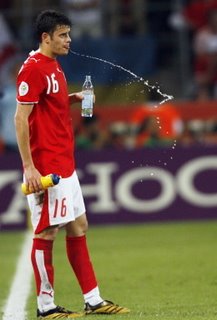Portugal through on penalties
 Portugal through on penalties
Portugal through on penaltiesPortugal advanced to the semifinals of the World Cup by beating England 3-1 in a penalty shootout after a 0-0 draw.Portugal are through to the last four of the World Cup after winning a penalty shootout against England in Gelsenkirchen.
Portugal march on to a semi-final date with either Brazil or France after defeating England 3-1 on penalties following a last eight clash that ended goalless in Gelsenkirchen on Saturday, 1 July.
Neither of these sides could find a way through during 120 minutes of entertaining and closely-contested action, with Portugal unable to translate into goals a numerical advantage they had held for almost an hour thanks to Wayne Rooney’s 62nd-minute dismissal.
The match therefore became the second 2006 FIFA World Cup™ quarter-final to be settled on penalty kicks and, just as Jens Lehmann was Germany’s hero yesterday, so Ricardo was Portugal’s today, saving from Frank Lampard, Steven Gerrard and Jamie Carragher to leave Cristiano Ronaldo to stroke home the decisive penalty.
After both teams had failed to score in 120 minutes of absorbing football, the match was eventually settled by penalties, and not for the first time England came up short in the ultimate test of nerve.
The result was somewhat harsh on Sven Goran Eriksson's men, who had fought bravely for the best part of an hour with only ten men following the second half dismissal of Wayne Rooney for stamping on Ricardo Carvalho.
For England Gary Neville came in at right-back, with Owen Hargreaves returning to the holding midfield role and Michael Carrick dropped to the bench. Frank Lampard started despite recent concern over an ankle injury.
Portugal were forced to bring in Tiago and Petit for the suspended forced Deco and Costinha, while Cristiano Ronaldo was passed fit to play.
The first chance of the game fell to Rooney in the second minute after a sloppy pass by Carvalho, but the England striker's effort was blocked. Rooney was again at the heart of the action when he brought a good save from Ricardo. The ball was switched to the other end and Cristiano Ronaldo, showing no ill effects from the injury he picked up in the second round game against Holland, drew a comfortable save from Robinson.
England had a scare moments later when they failed to clear a free-kick and Robinson had to be alert to deny the advancing Tiago.
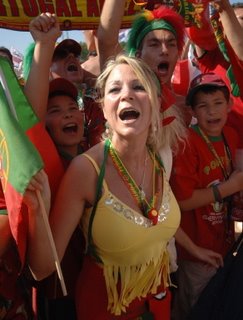 In the opening twenty minutes England were looking the more dangerous team going forward, although Ronaldo was a constant threat on the break for Portugal.
In the opening twenty minutes England were looking the more dangerous team going forward, although Ronaldo was a constant threat on the break for Portugal.
As the half progressed Portugal gradually began to get a grip on possession and their patient passing game was beginning to cause problems for an England side that had reverted to hitting the ball long to the isolated Rooney. Lampard did manage to produce a long range shot on target, but as the half-time whistle sounded, it was Portugal who will have been the happier team.
England had a good shout for a penalty when Nuno Valente appeared to handle a David Beckham cross but the referee waved play on. It was Beckham's final act before he was replaced by Aaron Lennon after picking up a knock in the opening moments of the second half.
Lennon made an immediate impact dribbling past three defenders and setting up Joe Cole, but the midfielder scooped his shot over the bar from ten yards.
Rooney, who appeared to be frustrated by the limitations of role saw his role up front, saw his temper boil over when he came under pressure from Carvalho and reacted by stamping on the defender. The referee showed the striker the red card and England had to play the remainder of the game with ten men.
Rooney's dismissal forced Eriksson to remove Joe Cole and bring on Peter Crouch up front. Despite their numerical disadvantage England initially seemed comfortable containing Portugal. Scolari's withdrawal of Pauletta, their sole striker, appeared a strange decision, given that their attack now lacked a focal point.
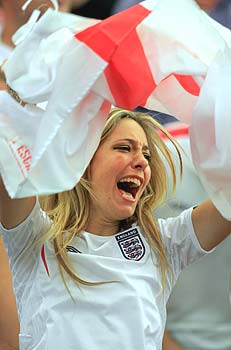 Figo came close for Portugal with 15 minutes remaining but his chipped effort was tipped away by Robinson. The England keeper had to be alert to deny Viana shortly afterwards as Portugal were finally gaining the ascendancy.
Figo came close for Portugal with 15 minutes remaining but his chipped effort was tipped away by Robinson. The England keeper had to be alert to deny Viana shortly afterwards as Portugal were finally gaining the ascendancy. At the other end Ricardo did well to deny a Lampard free-kick, as England launched a rare counter-attack. Lennon was first to the rebound but he scuffed his shot and the Portuguese keeper had no trouble gathering his shot. The ten-men held on until the end of full-time, and could even have nicked the game at the death when Terry's effort was deflected over the bar.
Inevitably Portugal dominated possession in extra-time, but they were mainly restricted to long range efforts. At the other end, England, on their occasional forays forward looked as likely to score with Crouch coming close from a Neville cross.
Portugal did have the ball in the back of the net when Postiga peeled off at the far post and planted a firm header past Robinson, but the linesman had flagged for offside.
England deserved to take the game to penalties given their magnificent rearguard battle with only ten men, but given their history of defeats at shootouts, then they must have approached the denouement with trepidation.
Simao scored Portugal's opening penalty, while Lampard's effort was saved by Ricardo. Viana then hit the post to give England a glimmer of hope, and when Hargreaves scored it was all square. Petit then struck his penalty wide but Gerrard was unable to give England the advantage, seeing his effort saved by the outstanding Ricardo. Postiga then stepped up to send Robinson the wrong way to give Portugal a 2-1 advantage which was maintained by another fine save from Ricardo from Carragher. That meant that Ronaldo could win the game if he scored and the winger made no mistake to send Portugal into the semi-finals.
Portugal are through to the last four where they will met Brazil or France, but on the evidence of this performance, they will have to raise their game significantly if they are to progress any further.
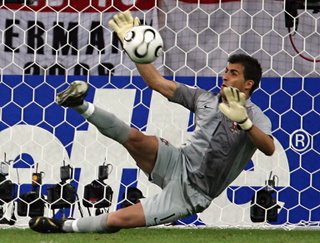
 Match Analysis:
Match Analysis: This was a heroic England performance, especially with ten men following the sending-off of Wayne Rooney in the 62nd minute. Despite this disadvantage Sven-Goran Eriksson's team continued to both defend and attack intelligently, creating more goal chances than their opponents.
Owen Hargreaves was the best player on the pitch the whole of the back four did extremely well. If you pick out one it would be Hargreaves, who encapsulated the England performance. His work rate was incredible with the number of balls he won in midfield and he still found the time to get forward.
It was a pity such a game had to be decided by penalties but once the game goes to penalties, it becomes a question of which team can handle their nerve and once again England were found lacking in a shoot-out. But over the 120 minutes they were the better team and Portugal can consider themselves quite fortunate to have survived this one.
England: Robinson, Neville, Ferdinand, Terry, A Cole, Beckham, Lampard, Hargreaves, Gerrard, J Cole, Rooney.
Subs used: Lennon 51 (for Beckham), Crouch 64 (for J Cole), Carragher 119 (for Lennon).
Bookings: Terry 30, Hargreaves 107, Sent-off: Rooney 63
Portugal: Ricardo, Miguel, Carvalho, Meira, Valente, Petit, Maniche, Tiago, Figo, Ronaldo, Pauleta.
Subs used: Simao 63 (for Pauletta), Viana 74 (for Tiago), Postiga 86 (for Figo)
Bookings: Petit 44, Carvalho 111
Referee: Horacio Elizondo (Argentina).
Penalties:
Portugal: Simao (Scored) Viana (Missed) Petit (Missed) Postiga (Scored) Ronaldo (Scored)
England: Lampard (Missed) Hargreaves (Scored) Gerrard (Missed) Carragher (Missed)

